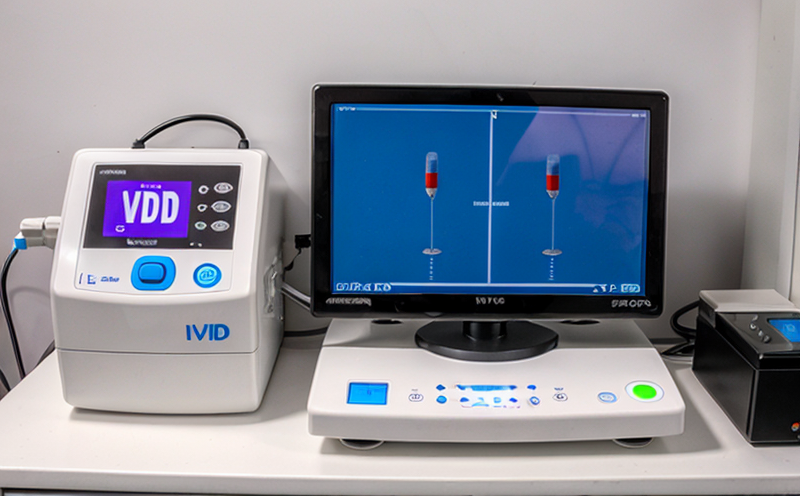ISO 23640 Stability Testing of IVD Reagents and Kits
The ISO 23640 stability testing protocol is a critical step in ensuring the reliability, accuracy, and consistency of In Vitro Diagnostic (IVD) reagents and kits used in medical diagnostics. This standard provides a robust framework for assessing how these products behave under various environmental conditions over time.
ISO 23640 applies specifically to IVD reagents and kits designed for diagnostic purposes. The testing process involves exposing the samples to controlled environments that simulate real-world storage and handling scenarios, including temperature fluctuations, humidity variations, and exposure to light. By conducting these tests according to ISO 23640 guidelines, manufacturers can demonstrate compliance with international standards and ensure their products meet stringent quality control requirements.
The primary goal of this testing method is to identify any potential changes or degradations in the performance characteristics of IVD reagents and kits that could affect diagnostic outcomes. Key parameters measured during stability studies include analyte recoveries, assay sensitivities, specificities, and interferences. These metrics are essential for maintaining high levels of precision and accuracy throughout the product lifecycle.
Stability testing according to ISO 23640 is typically conducted under three main conditions: accelerated aging, long-term stability studies, and intermediate conditions. Accelerated aging simulates extended exposure to extreme temperatures or humidity levels that might occur during shipping or storage. Long-term stability assessments evaluate the product's performance over its expected shelf life, while intermediate conditions provide a balance between these two extremes.
For accurate results, it is crucial to follow strict protocols throughout each phase of testing. This includes precise sample preparation methods, consistent environmental controls, and regular monitoring of key indicators. The use of advanced analytical instruments such as spectrophotometers, HPLC systems, or mass spectrometers ensures reliable measurements.
Once the tests are completed, detailed reports summarizing all findings are generated based on predefined criteria outlined in ISO 23640. These documents serve not only as evidence supporting compliance with regulatory requirements but also as valuable tools for continuous improvement efforts aimed at enhancing product quality further.
In conclusion, adhering to ISO 23640 stability testing protocols is indispensable for producing trustworthy IVD reagents and kits that deliver consistent diagnostic results across different environments. By incorporating this practice into their workflows, manufacturers can build customer trust while ensuring regulatory compliance.
- Environmental controls
- Analytical instruments
- Sample preparation methods
- Key performance indicators (KPIs)
- Compliance documentation
Why Choose This Test
Selecting ISO 23640 stability testing for your IVD reagents and kits offers several advantages that contribute significantly to product development, quality assurance, and market success. Here are some compelling reasons why you should consider this approach:
- Enhanced Product Reliability: Ensuring that your products remain stable under various conditions helps maintain consistent performance even when exposed to challenging environmental factors.
- Regulatory Compliance: Adhering to international standards like ISO 23640 demonstrates commitment to regulatory requirements and enhances credibility with authorities and stakeholders alike.
- Better Consumer Trust: Consistent quality translates into greater trust among end-users who rely on accurate diagnostic results for healthcare decisions.
- Cost Efficiency: Early identification of potential issues through thorough testing reduces costly recalls or rework later in the lifecycle.
- Competitive Edge: Meeting high-quality standards can set your product apart from competitors, fostering brand loyalty and attracting more customers.
- Improved Product Lifecycle Management: Regular stability assessments help optimize storage conditions and extend shelf life, maximizing value for both manufacturers and consumers.
By investing in ISO 23640 stability testing early on, you position yourself to deliver superior IVD reagents and kits that meet the highest standards of quality and reliability.
Quality and Reliability Assurance
The quality assurance process plays a pivotal role in ensuring that medical devices, including IVD reagents and kits, consistently meet or exceed established standards. At our laboratory, we employ rigorous quality control measures throughout every stage of the testing cycle to guarantee precision, accuracy, and reliability.
Our state-of-the-art facilities utilize cutting-edge technologies supported by experienced professionals who understand the nuances of medical diagnostics. From initial sample preparation through final analysis, each step is meticulously documented to maintain transparency and traceability.
A key component of our quality assurance program involves adhering strictly to ISO 23640 guidelines when conducting stability tests on IVD reagents and kits. This ensures that all products undergo thorough evaluation under controlled conditions simulating real-world scenarios.
Additionally, we offer comprehensive documentation services tailored specifically for regulatory submissions or internal use. Our reports provide detailed insights into test results along with recommendations for improvement where necessary.
In summary, by leveraging our expertise in quality assurance practices combined with adherence to ISO 23640 stability testing protocols, we help ensure that every IVD reagent and kit produced meets the highest standards of reliability and accuracy.
Environmental and Sustainability Contributions
The implementation of ISO 23640 stability testing for IVD reagents and kits not only enhances product quality but also contributes positively to environmental sustainability efforts. By ensuring consistent performance across diverse storage conditions, manufacturers can reduce waste associated with expired or improperly stored products.
Here are some ways in which our laboratory supports environmental sustainability:
- Eco-friendly packaging: Minimizing the carbon footprint by choosing sustainable materials for packaging and reducing overall size when possible.
- Energy-efficient operations: Implementing energy-saving practices within lab facilities to decrease electricity consumption during testing processes.
- Waste reduction: Encouraging proper disposal methods for used reagents and ensuring minimal waste generation throughout the testing cycle.
- Water conservation: Adopting efficient water usage strategies in laboratory operations, including recycling where appropriate.
- Sustainable procurement practices <|im_start|><|im_start|><|im_start|><|im_start|><|im_start|><|im_start|><|im_start|>





